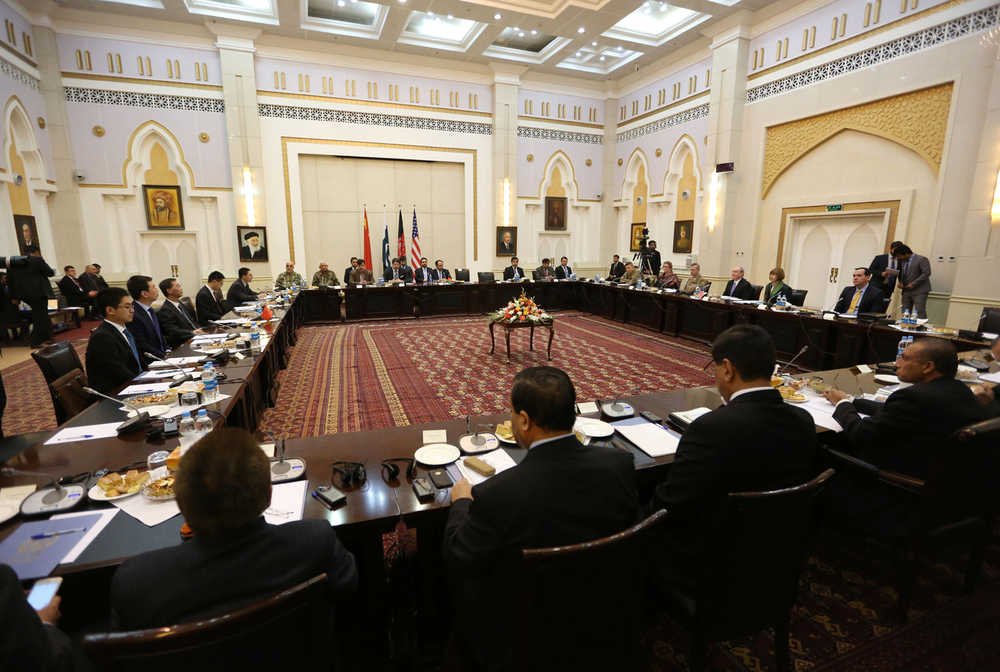KABUL, Afghanistan — Four countries trying to end Afghanistan’s 15-year war with the Taliban announced on Tuesday that direct talks between the Afghan government and the insurgent group will take place next week.
Representatives of Afghanistan, Pakistan, China and the United States met in the Afghan capital for a fourth round of discussions to set conditions for eventual peace talks between Kabul and the Taliban.
In a joint statement, they invited insurgents to join the talks, which will be the first between the two sides since the peace process was restarted last month. Efforts to bring the warring sides together last year were derailed when Kabul revealed that the Taliban’s one-eyed leader Mullah Mohammad Omar had been dead for more than two years.
In Tuesday’s communique, the four countries “expressed strong support for the upcoming direct talks between the government of Afghanistan and authorized representatives of the Taliban and other groups.” The talks would take place in Pakistan.
The delegations were led by Afghan Deputy Foreign Minister Hekmat Khalil Karzai, Pakistan’s Foreign Secretary Aizaz Ahmad Chaudhry, Chinese Ambassador to Afghanistan Yao Jing and U.S. Charge d’Affaires in Kabul David Lindwall. They said they would meet again immediately after the direct Kabul-Taliban talks.
It was the fourth meeting of the so-called Quadrilateral Cooperation Group, which has earlier called on the Taliban to enter peace talks with Kabul and work toward cutting violence that has killed thousands of Afghan civilians since the insurgency started almost 15 years ago.
Taliban leaders, who fled across the Pakistan border to escape the 2001 U.S. invasion, are believed to be harbored by Pakistani authorities, in particular the ISI intelligence agency, in cities including Quetta, Karachi and Peshawar. While Pakistan denies providing safe havens for the insurgents, Afghan President Ashraf Ghani has led accusations that the Taliban are a proxy force for Islamabad’s regional interests.
This deep mistrust of Pakistan means that “it is three against one around the talks table,” said an Afghan official who asked not to be named as the sensitivity of the issue meant he had no authority to speak publicly.
While China is a reluctant international peace broker, as its own foreign policy is built on a principle of “non-interference” in other countries’ affairs, its presence does appear to be yielding results. Analysts agreed that China appears to be exerting a useful influence on its ally, Islamabad.
“Their close, longstanding security relationship gives China unique leverage but there are also positive incentives,” said Andrew Small, an expert on China’s relationships with Pakistan and Afghanistan, and author of “The China-Pakistan Axis.”
China’s multi-billion dollar development plans for Pakistan, through the China-Pakistan Economic Corridor, require a “stable neighborhood,” Small said. “China’s presence at the talks is also a reassurance that Pakistan’s interests will be looked after in any settlement — they’re a trusted partner and it reduces the Pakistani anxiety about deals being done behind their back.”
China also has ties with the Taliban dating to their 1996-2001 rule, when Beijing sent representatives to Kabul and Kandahar to secure guarantees that anti-Beijing groups such as the East Turkistan Islamic Movement would not use Afghanistan as a base from which to attack China. Beijing is concerned the Muslim Uighurs of the far-west Xinjiang province, which shares a short border with Afghanistan, present a nascent threat to its national security, through groups like the ETIM.
Raffaello Pantucci, director of international security studies at London’s Royal United Services Institute, said all parties to the peace process realize that China “is the one regional power which has lots of money, meaning they all want Chinese support and investment,” he said.
Afghanistan has long courted Chinese investment in developing its infrastructure and minerals sector. China has ambitions for Afghanistan’s raw materials as well as for using the country as a route to the markets of the west.
Three officials close to the talks process have said that Pakistan’s representatives had earlier given assurances that violence will be noticeably reduced in coming weeks.
The Taliban have announced the date of their so-called spring offensive most years since launching their insurgency, a ritual the officials said could be suspended this year, helping build trust between Afghanistan and Pakistan.
——
Associated Press writer in Kabul, Rahim Faiez contributed to this story.

